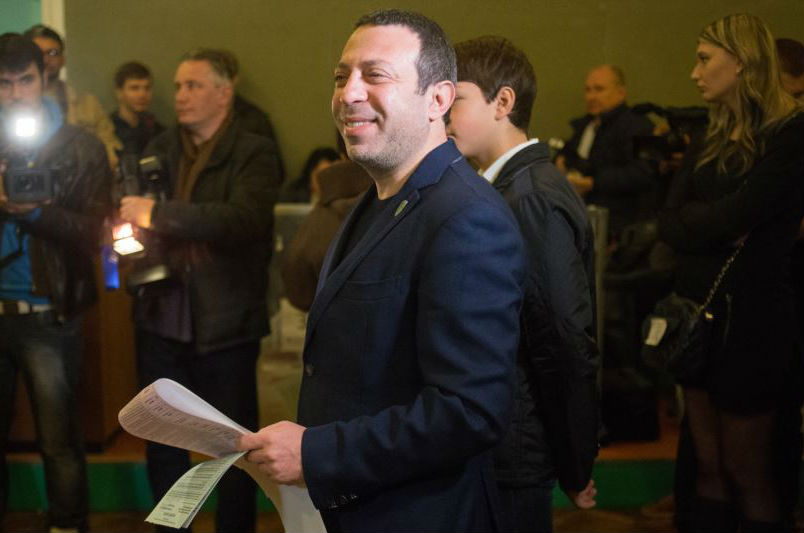 Ukrainian President Petro Poroshenko’s government appears to have launched a new anticorruption drive with the October 31 detention of Gennadiy Korban, a close associate of oligarch Ihor Kolomoisky and the leader of Ukrop, a political party funded by Kolomoisky. The authorities arrested Korban following an investigation that began last year into the assault on government official Serhiy Rudyk and the poisoning of Dnipropetrovsk Prosecutor General Roman Fedik. In addition, the Prosecutor General’s Office arrested Mikhail Koshlyak, a senior aide to Boris Filatov, who is another of Kolomoisky’s associates and the Ukrop candidate for Mayor of Dnipropetrovsk. Koshlyak was arrested in connection with the murder of an officer of the Security Service of Ukraine (the SBU).
Ukrainian President Petro Poroshenko’s government appears to have launched a new anticorruption drive with the October 31 detention of Gennadiy Korban, a close associate of oligarch Ihor Kolomoisky and the leader of Ukrop, a political party funded by Kolomoisky. The authorities arrested Korban following an investigation that began last year into the assault on government official Serhiy Rudyk and the poisoning of Dnipropetrovsk Prosecutor General Roman Fedik. In addition, the Prosecutor General’s Office arrested Mikhail Koshlyak, a senior aide to Boris Filatov, who is another of Kolomoisky’s associates and the Ukrop candidate for Mayor of Dnipropetrovsk. Koshlyak was arrested in connection with the murder of an officer of the Security Service of Ukraine (the SBU).
While Ukrainian civil society has spent months criticizing Poroshenko for his lethargic response to corruption, the reaction to these steps has been decidedly mixed. There is little sympathy for Korban, who has a reputation as Kolomoisky’s chief lieutenant in the oligarch’s forcible seizure of commercial assets. Still, some wonder why nothing has been done to go after close associates of ex-President Viktor Yanukovych. And while the Prosecutor General’s Office and the SBU stress that there is nothing political to the action, others see selective justice.
An analyst sympathetic to Poroshenko’s political troubles notes that this is selective justice, by necessity. Poroshenko’s favorability ratings have dropped precipitously in the polls to 27 percent, and his failure to move on corruption is one reason. Euromaidan activists would like to see corrupt officials from the Party of Regions be prosecuted, especially those responsible for the use of force against protesters there. Poroshenko needs to do something to show that he understands the importance of the issue, but his majority in the Rada is not very stable, and investigating corruption in his own coalition could lead to the loss of his parliamentary majority.
Poroshenko has also tried to use this investigation against Korban to solve a serious problem on his team: the hostility between SBU Chief Vasily Hrytsak and Prosecutor General Viktor Shokin. This antagonism was the result of a successful anticorruption operation that the SBU Chief conducted earlier this year against staff in the Prosecutor General’s Office, including some of Shokin’s close aides. The Prosecutor General was reportedly seeking the dismissal of Deputy Prosecutor General Vitaliy Kasko, who cooperated with the SBU in the move against corrupt officials in his office. Poroshenko likely hopes that in making Shokin and Hrytsak partners against Korban and Kolomoisky, the Prosecutor General will forget, or at least pay less attention to, his grievance against the SBU Chief.
It is also likely that Poroshenko hopes that by giving Shokin a high-profile role in the investigation and likely prosecution of Korban, he will tamp down the increasingly loud calls for Shokin’s removal. This hope will not be realized. Indeed, Shokin’s presence as Prosecutor General is one of the reasons reformers do not view the prosecution of Korban as a strong step against corruption. And if Shokin manages to fire Kasko while prosecuting Korban, the reformers’ cynicism will be amply justified.
John E. Herbst is Director of the Dinu Patriciu Eurasia Center at the Atlantic Council. He served as US Ambassador to Ukraine from 2003 to 2006.
Image: Gennadiy Korban votes in the Kyiv mayoral election on October 25. Credit: RFE/RL
